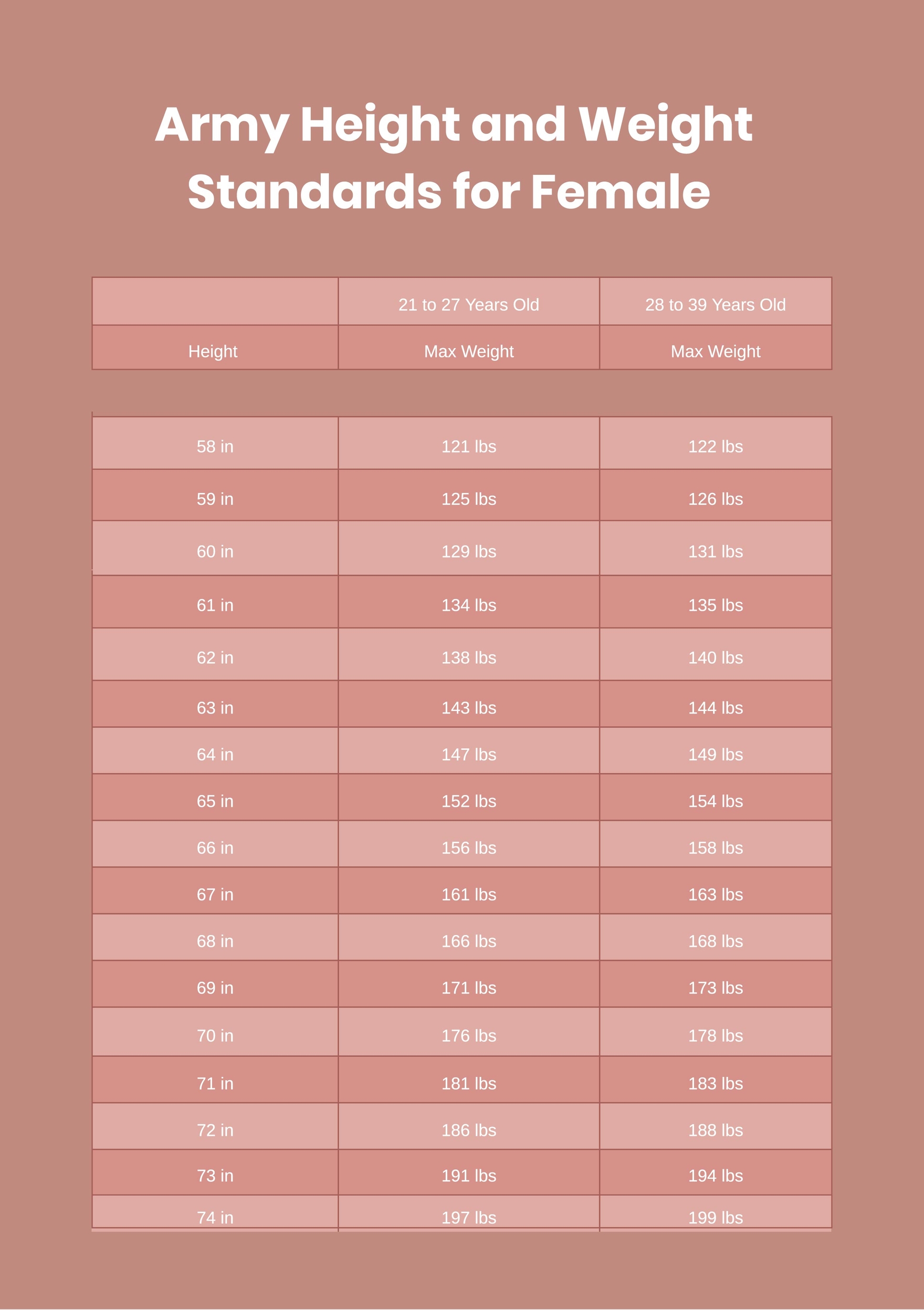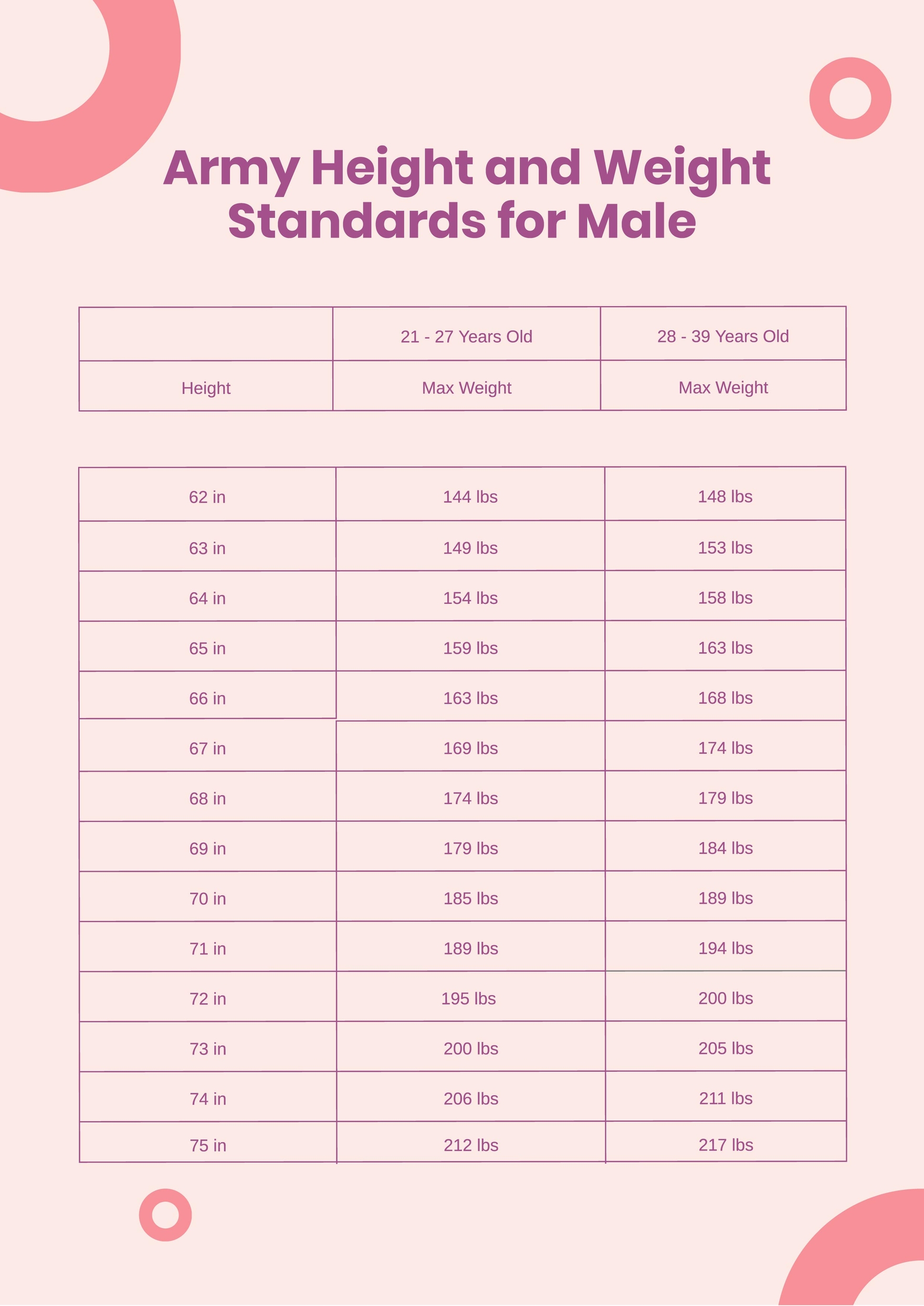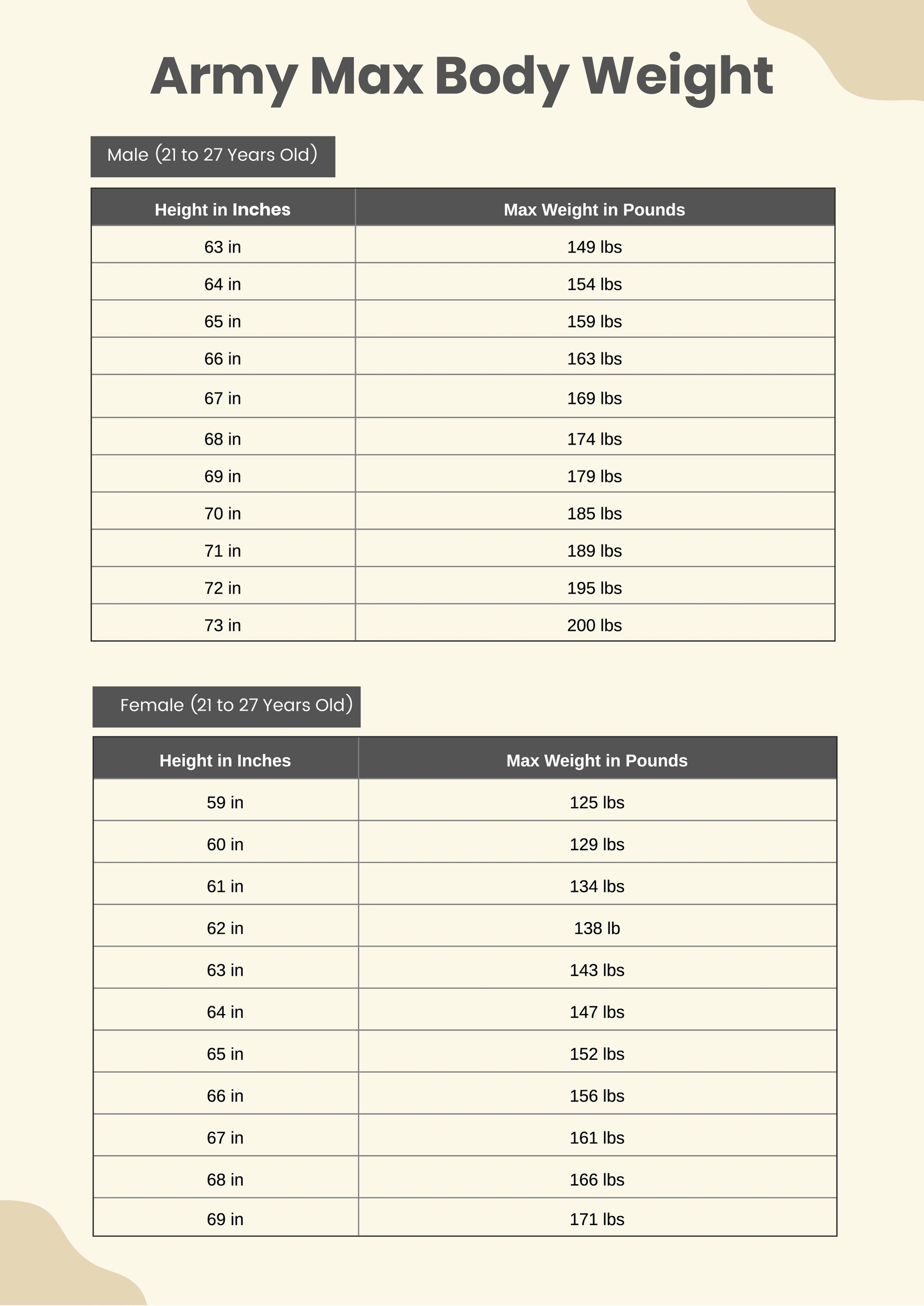US Military Height And Weight Requirements: The Full Breakdown You Need To Know
So here's the deal, folks. If you're thinking about joining the US military, one of the first things you need to get straight is their height and weight requirements. It's not just about being fit or strong; it's about meeting specific standards that ensure soldiers are physically capable of handling the demands of military life. These requirements aren't just random numbers pulled out of thin air—they're based on years of research and experience. So, if you're wondering whether you fit the bill, this is the article for you.
Now, I know what you're thinking—"Why does the military even care about my height and weight?" Well, here's the thing. The military isn't just looking for people who can lift heavy stuff or run fast. They're looking for individuals who can maintain peak physical condition over long periods. Height and weight play a big role in that because they affect everything from endurance to mobility. It's all about being the best version of yourself, physically and mentally.
And before we dive into the nitty-gritty, let me just say this: don't stress too much if you're not where you need to be right now. The military offers programs and resources to help you get there. But first, let's break down exactly what the US military expects when it comes to height and weight. Stick with me, and by the end of this, you'll have all the info you need to make an informed decision about your future.
- Movierulz Risks Legality Safe Movie Streaming Alternatives
- Alana Cho Leaks The Full Story What It Means For You
Understanding the Importance of US Military Height and Weight Standards
Alright, let's get real for a second. The US military doesn't set height and weight requirements just for fun. These standards exist for a reason. They're designed to ensure that every soldier is physically fit enough to handle the challenges of military life. Whether it's carrying heavy gear, marching long distances, or operating in extreme environments, your body needs to be up to the task.
Think about it this way: if you're carrying 50 pounds of equipment, being overweight or underweight can seriously impact your performance. It's not just about looking good in uniform—it's about being able to do your job effectively and safely. That's why the military takes these requirements so seriously. They want to make sure every soldier is in top condition before they step onto the battlefield.
Now, I know some people might think these standards are outdated or unfair. But trust me, they're not. They're based on decades of research and experience. The military has studied what works and what doesn't when it comes to physical fitness. And guess what? These standards have been proven to work. So, if you're serious about joining the military, it's important to understand why these requirements matter and how they can help you succeed.
- Movierulz Kannada Movies Whats Streaming In 2024 Beyond
- Deferred Deep Linking Get App Content Even Without It
What Are the US Military Height and Weight Requirements?
Okay, let's cut to the chase. What exactly are the height and weight requirements for the US military? Well, it depends on a few factors, including your age, gender, and branch of service. But here's the basic breakdown:
- For men, the maximum allowable weight varies based on height and age. For example, a 5'9" male in the Army can weigh up to 168 pounds if they're 17-20 years old, but that number drops to 163 pounds if they're 21-27 years old.
- For women, the numbers are a bit different. A 5'5" female in the Air Force can weigh up to 146 pounds if they're 17-20 years old, but that limit drops to 141 pounds if they're 21-27 years old.
Now, these numbers might seem strict, but there's a good reason for them. The military wants to make sure every soldier is in the best possible shape. And remember, these are maximum weights. Ideally, you'll want to be below these limits if you can. But don't worry if you're not there yet. The military offers programs to help you get into shape before you enlist.
Why Do the Standards Vary by Age and Gender?
Here's the thing: not everyone is built the same. That's why the military adjusts its height and weight requirements based on age and gender. Younger soldiers tend to have faster metabolisms, so they can handle a little extra weight. As you get older, your metabolism slows down, so the limits get stricter. And women naturally carry more body fat than men, so their weight limits are a bit higher.
It might not seem fair, but these adjustments are based on science. The military isn't trying to discriminate—they're just acknowledging the biological differences between people. So, if you're a 25-year-old woman who's a few pounds over the limit, don't panic. You can still meet the requirements with a little effort and determination.
How Are Height and Weight Measured in the Military?
Alright, let's talk about how the military actually measures height and weight. It's not as simple as stepping on a scale or standing next to a ruler. The military uses a formula called the Body Mass Index (BMI) to determine whether you meet the height and weight requirements. BMI takes into account both your height and weight to give a more accurate picture of your overall fitness.
Here's how it works: your weight in kilograms is divided by your height in meters squared. The result is your BMI. For most branches of the military, the ideal BMI range is between 18.5 and 24.9. If your BMI falls outside of that range, you might have trouble meeting the requirements. But don't worry—there are ways to adjust your BMI if you need to.
What Happens If You Don't Meet the Requirements?
So, what happens if you show up to basic training and you're over the weight limit? Well, it depends. Some branches of the military will give you a chance to lose weight before you're disqualified. Others might require you to complete a fitness test to prove you're still capable of performing your duties. Either way, it's not the end of the world. The military wants you to succeed, so they'll work with you to help you get where you need to be.
But here's the thing: it's always better to meet the requirements before you enlist. That way, you won't have to stress about being sent home or held back during training. Plus, being in shape will make your time in the military a lot easier. So, if you're even a little worried about meeting the height and weight requirements, start working on it now. Trust me, your future self will thank you.
Exceptions to the Height and Weight Requirements
Now, I know what you're thinking—"What if I'm an exception to the rule?" Well, here's the good news: the military does make exceptions in certain cases. For example, if you're a highly qualified candidate with skills that are in demand, they might overlook a minor weight issue. Or if you have a medical condition that affects your weight, they might adjust the requirements for you.
But here's the catch: exceptions are rare, and they're not automatic. You'll need to provide documentation and go through a review process to prove that you deserve an exception. And even if you do get one, you'll still need to meet the fitness standards once you're in the military. So, while exceptions are possible, it's always best to try to meet the requirements on your own.
How to Request an Exception
If you think you qualify for an exception, here's what you need to do:
- Provide medical documentation to support your case.
- Submit a formal request through your recruiter.
- Be prepared to explain why you deserve an exception and how you plan to meet the requirements in the future.
Keep in mind that the decision to grant an exception is not up to your recruiter. It's made by higher-ups in the military, so you'll need to make a strong case for yourself. And remember, even if you get an exception, you'll still need to work hard to meet the fitness standards once you're in the military. So, if you can avoid needing an exception, that's always the better option.
Tips for Meeting the Height and Weight Requirements
Okay, let's talk about the elephant in the room. What if you're not where you need to be when it comes to height and weight? Don't panic. There are plenty of things you can do to get into shape and meet the requirements. Here are a few tips to help you get started:
- Start with a balanced diet. Focus on eating whole, nutritious foods like fruits, vegetables, lean proteins, and whole grains. Cut back on processed foods, sugary drinks, and snacks.
- Get moving. Whether it's running, lifting weights, or taking a fitness class, find an exercise routine that works for you and stick with it.
- Stay hydrated. Drinking plenty of water can help you lose weight and improve your overall health.
- Get enough sleep. Rest is just as important as diet and exercise when it comes to losing weight and getting fit.
Remember, this isn't a sprint—it's a marathon. You won't see results overnight, but if you stay consistent, you'll get there. And once you do, you'll be in the best shape of your life. Trust me, it's worth it.
Common Misconceptions About US Military Height and Weight Requirements
There are a lot of myths and misconceptions floating around about the US military's height and weight requirements. Let's clear some of them up:
- Myth: You have to be super skinny to join the military. Fact: The military doesn't care about how skinny you are. They care about whether you're at a healthy weight for your height and age.
- Myth: You can't join the military if you're overweight. Fact: While being overweight can make it harder to meet the requirements, it's not an automatic disqualification. Many people lose weight and get into shape before enlisting.
- Myth: The height and weight requirements are the same for every branch of the military. Fact: Each branch has its own standards, so it's important to check the requirements for the branch you're interested in.
So, if you've been believing any of these myths, now you know the truth. The military's height and weight requirements are challenging, but they're not impossible. With a little effort and determination, you can meet them and start your journey to becoming a soldier.
How to Separate Fact from Fiction
When it comes to the US military's height and weight requirements, it's important to get your information from reliable sources. Don't rely on hearsay or rumors—do your research. Talk to your recruiter, read official military publications, and consult with fitness experts. The more you know, the better prepared you'll be to meet the requirements and succeed in the military.
The Role of Physical Fitness in the Military
Let's take a step back for a second and talk about why physical fitness is so important in the military. It's not just about meeting height and weight requirements—it's about being ready for anything. Whether you're deployed to a war zone or stationed at a base in the US, you need to be in top physical condition to do your job effectively.
Think about it: soldiers are often required to carry heavy gear, march long distances, and operate in extreme environments. If you're not physically fit, you won't be able to handle these challenges. That's why the military takes fitness so seriously. They want to make sure every soldier is capable of performing their duties safely and effectively.
How to Stay Fit After Enlisting
Once you're in the military, staying fit becomes even more important. Here are a few tips to help you maintain your physical fitness:
- Follow the military's fitness program. Each branch has its own program designed to keep soldiers in shape.
- Set personal goals. Whether it's running a marathon or lifting a certain amount of weight, having goals will keep you motivated.
- Find a workout buddy. Exercising with a friend can make it more fun and help you stay accountable.
Remember, fitness isn't just about looking good—it's about being ready for anything. So, make it a priority and stick with it. Your body—and your career—will thank you.
Conclusion: Your Journey to Meeting the US Military Height and Weight Requirements
Well, there you have it, folks. The US military's height and weight requirements might seem intimidating at first, but they're not impossible to meet. With a little effort and determination, you can get into shape and start your journey to becoming a soldier. Just remember to stay focused, stay consistent, and don't be afraid to ask for help if you need it.
And here's the thing: meeting these requirements isn't just about joining the military. It's about taking control of your health and fitness. Whether you end up enlisting or not, the skills and habits you develop along the way will serve you well for the rest of your life. So, what are you waiting for? Get out there and start
Article Recommendations
- Kannada Movies Online Watch The Latest Best 20222025
- Movierulz Kannada Your Guide To Streaming New Releases



Detail Author:
- Name : Eugene Barrows
- Username : ibrahim.beer
- Email : amalia.dach@rempel.com
- Birthdate : 1989-06-23
- Address : 128 Lynch Park North Ofeliashire, UT 50785
- Phone : +1-331-648-4396
- Company : Baumbach Inc
- Job : Fitter
- Bio : Pariatur id sint ipsum beatae corporis sint velit. Totam voluptas ipsa possimus id asperiores. Beatae iste aut dicta debitis facilis fugiat.
Socials
linkedin:
- url : https://linkedin.com/in/tyler180
- username : tyler180
- bio : Ipsa eum nulla enim earum cumque.
- followers : 594
- following : 752
instagram:
- url : https://instagram.com/dooleyt
- username : dooleyt
- bio : Eligendi et et corporis ut non rem. Omnis quis atque ullam. Qui possimus repellat velit.
- followers : 888
- following : 1123
twitter:
- url : https://twitter.com/tyler6751
- username : tyler6751
- bio : Qui voluptatem qui exercitationem qui. Aut quo id itaque eveniet. Eum repellendus enim quos dolor modi iusto. Eaque dignissimos occaecati quia beatae aliquid.
- followers : 1193
- following : 2557
tiktok:
- url : https://tiktok.com/@tdooley
- username : tdooley
- bio : Qui odit sint placeat repudiandae nihil totam totam nobis.
- followers : 4730
- following : 708